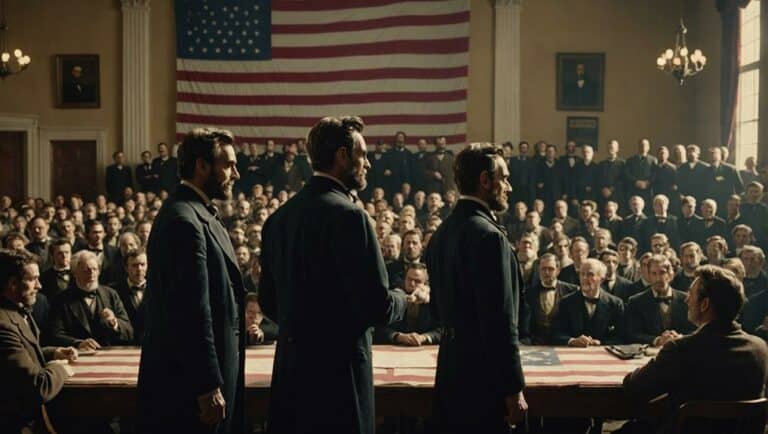The 1864 election between Abraham Lincoln and George B. McClellan was a pivotal moment in American history, occurring amidst the turmoil of the Civil War.
Discover how Lincoln's leadership and McClellan's challenges shaped the nation's future and led to Union victory and reconstruction.
Historical Context
Set against the backdrop of the American Civil War, the 1864 presidential election between Abraham Lincoln and George B. McClellan occurred at a critical juncture in the nation's history. This United States presidential election was unique as it was conducted solely by states that hadn't seceded from the Union, underscoring the fractured political landscape.
Abraham Lincoln, representing the National Union Party—a coalition of Republicans and War Democrats—sought re-election to secure the continuation of his policies aimed at preserving the Union and achieving a Union victory. His leadership was vital during this period, as his strategic decisions had significant implications for the war effort and the post-war reconstruction that would follow.
On the other hand, McClellan, the Democratic Party candidate, campaigned on a platform that called for immediate peace negotiations with the Confederacy, appealing to war-weary voters. However, the Union's military successes leading up to the election bolstered Lincoln's standing.
Lincoln's re-election didn't just secure his leadership but also marked a turning point in the Civil War. His victory was seen as a mandate to continue pursuing the Union's objectives, shaping the course of American history and laying the groundwork for future reconstruction efforts.
Political Dynamics
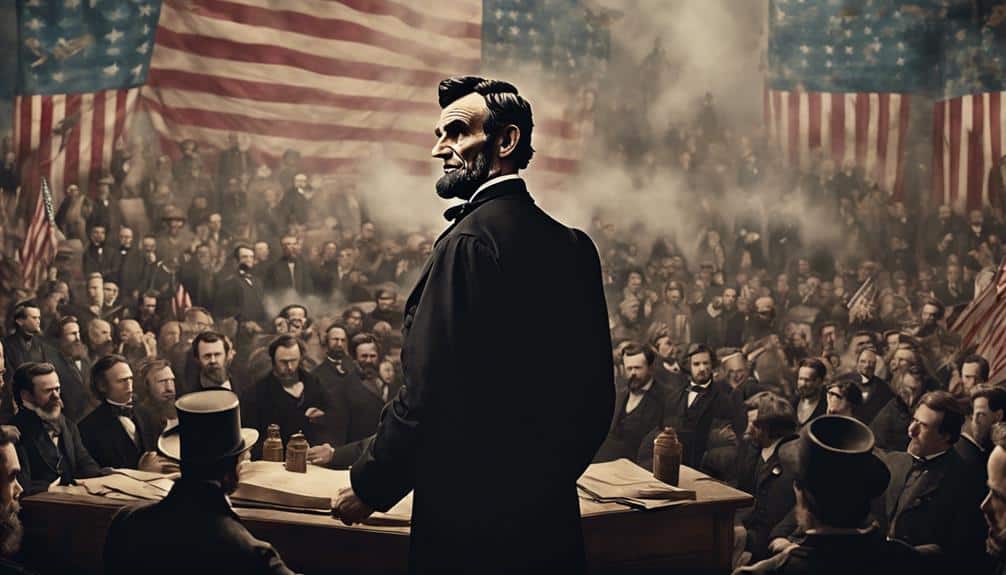
You'll see that wartime political discord greatly influenced the election, with internal strife such as Copperhead opposition and cabinet struggles testing Lincoln's leadership.
The Democratic Party's division over war continuation or peace negotiations further complicated the political landscape, leading to McClellan's contentious nomination.
Understanding these dynamics is vital to grasping how Lincoln managed to maintain unity and secure widespread support despite the challenges.
Wartime Political Discord
Wartime political discord during the Election of 1864 was marked by intense internal struggles within both the Republican and Democratic parties, reflecting the nation's deep divisions over the Civil War. The Democratic Party was particularly fractured over the issue of continuing the war versus negotiating peace. George B. McClellan, who ran on a platform advocating for the preservation of the Union, faced the challenge of uniting a party with conflicting views on the war. His presidential campaign was hindered by this internal discord, making it difficult to present a cohesive strategy against Abraham Lincoln.
On the Republican side, Lincoln wasn't immune to political discord either. He'd to navigate opposition from within his own party, including potential challengers like Secretary of State Salmon P. Chase and John C. Frémont. Copperheads, Northern Democrats who opposed the war, also exerted pressure, criticizing Lincoln's wartime policies and advocating for immediate peace with the Confederacy. Despite these challenges, Lincoln's strategic decisions and leadership during the Civil War played an essential role in maintaining unity within his party and ultimately securing his re-election.
Understanding these political dynamics is key to grasping the broader context of the Election of 1864 and its significance in shaping America's future.
Democratic Party Division
Sailing the Democratic Party's division between Copperheads and War Democrats, George B. McClellan's campaign faced significant obstacles in presenting a unified front against Abraham Lincoln. The Copperheads, advocating for an immediate end to hostilities, contrasted sharply with the War Democrats, who supported continuing the Civil War effort. This stark division led to internal tensions that plagued McClellan's campaign from the outset.
McClellan's nomination itself was a product of compromise, reflecting the fractured nature of the Democratic Party. While McClellan, a War Democrat, sought to appeal to both factions, his task proved formidable. The Copperheads' call for an immediate peace clashed with McClellan's own military background and his reluctance to abandon the war effort entirely. This ideological rift weakened his support base and made it difficult to rally Democrats around a cohesive platform.
The Democratic Party division presented numerous challenges for McClellan, limiting his ability to mount a robust campaign. Internal tensions eroded his credibility and hampered efforts to present a united opposition to Lincoln's re-election bid. Consequently, McClellan only secured a handful of states, such as Kentucky, Delaware, and New Jersey, highlighting the deep-seated challenges within his campaign.
Election Results
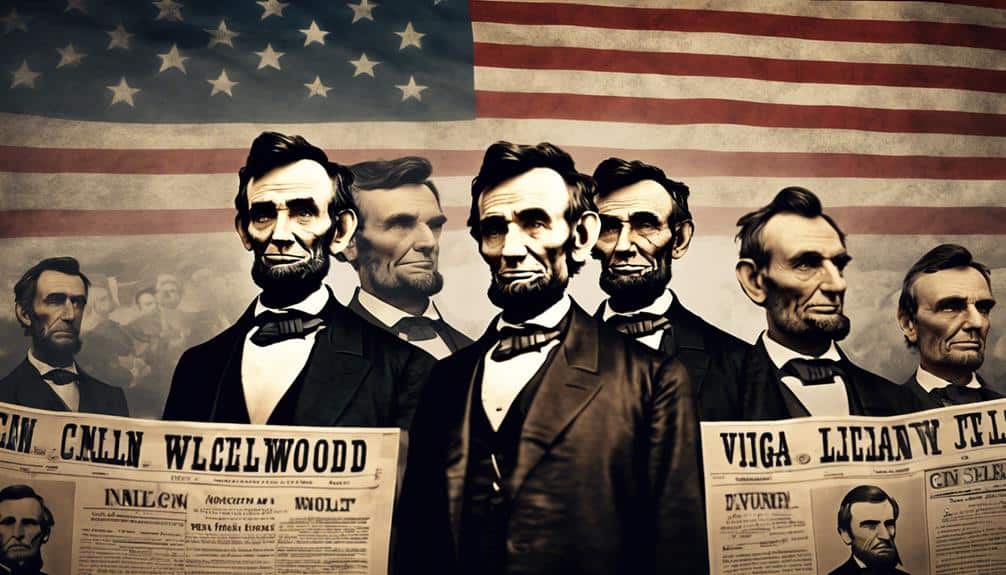
You can clearly see Lincoln's electoral dominance in the 1864 election, as he secured 212 electoral votes compared to McClellan's mere 21.
Despite a relatively close popular vote, McClellan only managed to win three states.
This stark contrast highlights Lincoln's widespread support, especially among Union soldiers, and underscores McClellan's limited success.
Lincoln's Electoral Dominance
Lincoln's electoral dominance in the 1864 election, underscored by his commanding victory with 212 electoral votes to McClellan's mere 21, signaled a decisive endorsement of his leadership and policies during the Civil War. This overwhelming triumph wasn't just a product of the electoral votes; Lincoln also secured over 2.2 million popular votes compared to McClellan's approximately 1.8 million. The re-election of Lincoln marked the first time a president achieved this feat since Andrew Jackson in 1832, demonstrating significant public confidence in his administration during a pivotal period.
Union soldiers played a pivotal role in Lincoln's success, with an impressive 78% of their votes going to him. Their support reflected the alignment of his wartime policies with the soldiers' experiences and aspirations for preserving the Union. McClellan, on the other hand, only managed to secure victories in three states: Kentucky, Delaware, and New Jersey. These results illustrate the geographic and political divides of the time, with McClellan's limited appeal failing to resonate broadly across the nation.
Lincoln's electoral and popular vote margins underscored his ability to unify a war-torn country under his leadership during one of its most challenging eras.
McClellan's Limited Success
While Lincoln's electoral dominance showcased widespread support for his leadership, McClellan's limited success in securing only three states—Kentucky, Delaware, and New Jersey—underscored the substantial challenges his campaign faced. Despite his strong military background, George B. McClellan managed to earn just 21 electoral votes compared to Lincoln's overwhelming 212.
His campaign floundered during this critical period, struggling to gain traction and failing to resonate with a broader electorate.
In analyzing McClellan's limited success, several key points highlight the hurdles his campaign encountered:
- Electoral Votes: McClellan's meager 21 electoral votes starkly contrasted with Lincoln's decisive victory, showcasing the limited geographic support he received.
- Popular Votes: The gap in popular votes was significant, with Lincoln triumphing by over 500,000 votes, reflecting the overwhelming support for his leadership during the Civil War.
- Campaign Floundering: Despite his military credentials, McClellan's campaign couldn't effectively counter Lincoln's narrative, leading to a lackluster performance.
McClellan's inability to secure more than three states highlighted the electorate's preference for continuity and Lincoln's handling of the war effort. This decisive victory for Lincoln proved critical in shaping America's future during a transformative era.
Campaign Strategies
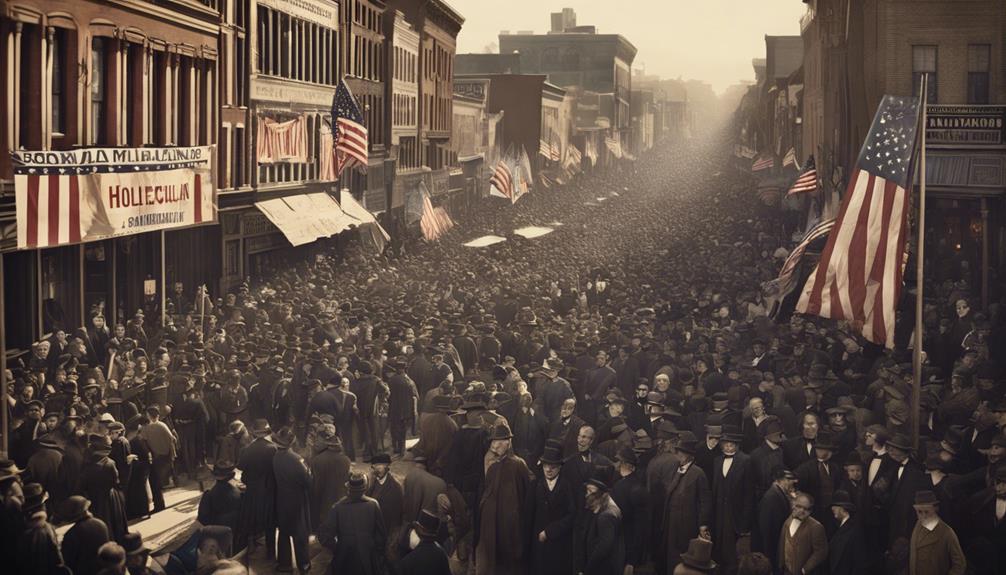
Analyzing the campaign strategies of the 1864 election reveals how both Lincoln and McClellan tailored their messages to address the nation's critical wartime concerns. Lincoln, running on the National Union Party ticket, aimed to preserve the Union and continue the war effort. He strategically unified Republicans and War Democrats, using the slogan 'Don't change horses in the middle of a stream' to emphasize the importance of stability and unity.
Lincoln's focus on emancipation as a central issue showcased his commitment to ending slavery, which helped solidify his support base.
McClellan, on the other hand, campaigned on a peace platform, advocating for negotiations to bring an end to the Civil War. His approach aimed to appeal to war-weary citizens desperate for peace. Both candidates utilized campaign mementos, slogans, and songs to rally support.
These strategic decisions highlighted the stark contrast between Lincoln's commitment to a united war effort and McClellan's promise of immediate peace. Each side leveraged their messaging to galvanize their supporters, making the election a pivotal moment in determining America's future direction.
Momentum Shift
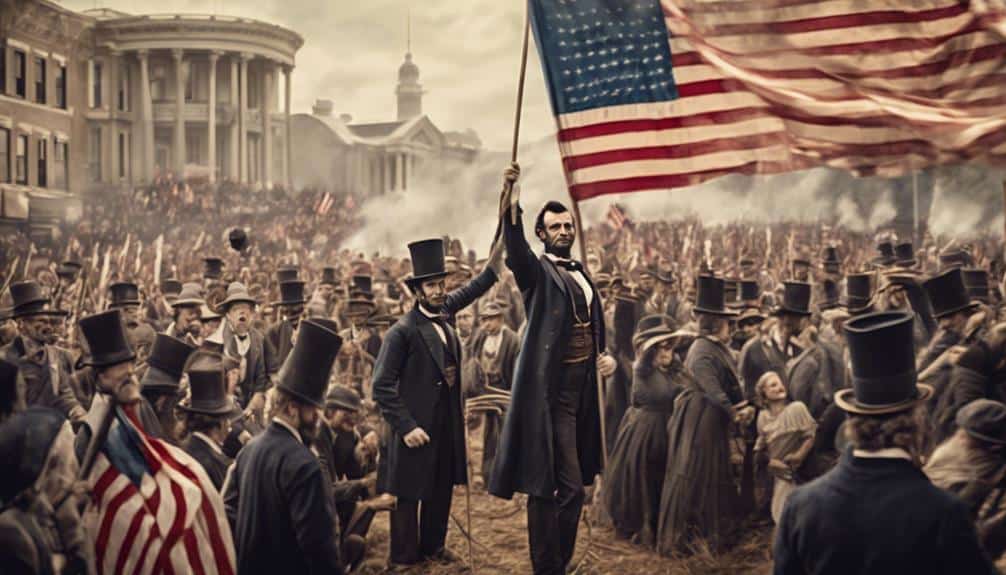
The capture of Atlanta by Gen. Sherman in September 1864 shifted the momentum in favor of Lincoln's re-election campaign. This pivotal event boosted Northern morale and showcased the Union's military prowess, making Abraham Lincoln's leadership appear more effective and decisive.
Several factors contributed to this momentum shift:
- Frémont withdrew: John C. Frémont's exit from the race unified the anti-Democratic vote, consolidating support behind Lincoln and the Union Party.
- McClellan's rejection: George McClellan's refusal to fully embrace the peace plank of the Democratic Party platform created internal tensions and weakened his campaign.
- Union Party mobilized: Lincoln's strategic decisions, particularly his firm stance on emancipation, galvanized the Union Party, which became highly mobilized and effective.
Lincoln's strategic decisions, including his emphasis on emancipation, were critical. They attracted a broad coalition of voters committed to ending slavery and preserving the Union.
Meanwhile, McClellan's campaign struggled with internal divisions and failed to present a coherent alternative to Lincoln's policies. These dynamics resulted in a landslide victory for Lincoln, who won decisively in the electoral college and secured his mandate to continue leading the nation through the Civil War.
Vice Presidential Candidate
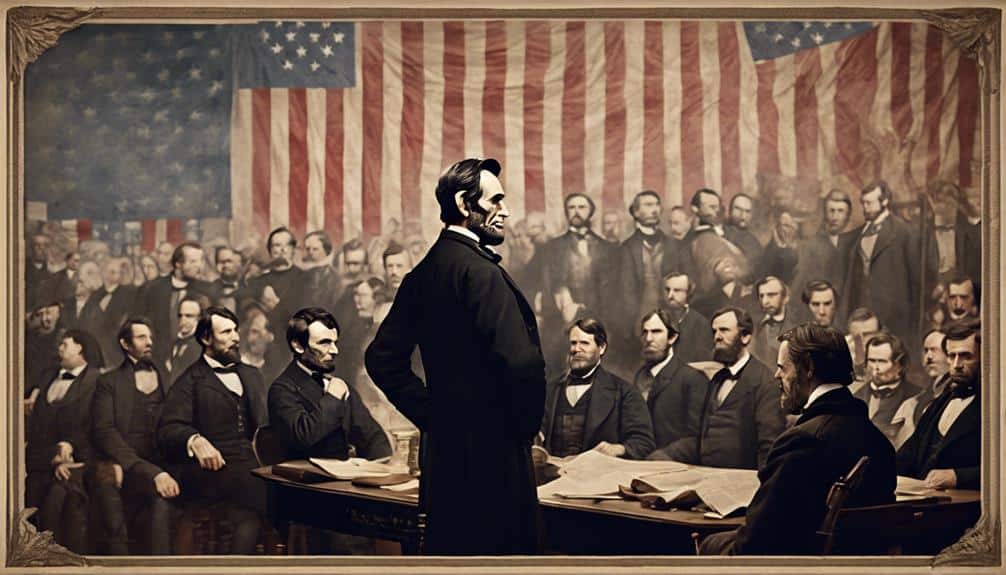
Lincoln's strategic considerations extended to his choice of vice presidential candidate, selecting Andrew Johnson to bolster support among War Democrats and border states. Abraham Lincoln understood that the 1864 election required more than just a compelling presidential candidate; it necessitated a running mate who could attract votes from diverse factions. Johnson, a Southern Democrat who remained loyal to the Union, fit this role perfectly.
Lincoln's strategic selection of Johnson aimed to solidify support from War Democrats who might be reluctant to vote for a Republican ticket. By choosing a Democrat, Lincoln effectively reached across party lines, appealing to those who supported the war effort but were wary of the Republican platform. Additionally, Johnson's roots in Tennessee, a border state, provided further geographical and political balance to the ticket.
This choice wasn't without risks, but it demonstrated Lincoln's sharp political acumen. Johnson's presence on the ticket assured border states and moderate Democrats that their interests would be represented, thereby broadening Lincoln's electoral appeal.
Johnson's role as vice presidential candidate played a pivotal part in securing Lincoln's re-election, influencing the course of American history by uniting a fragmented electorate during a pivotal moment in the nation's development.
Lasting Impact
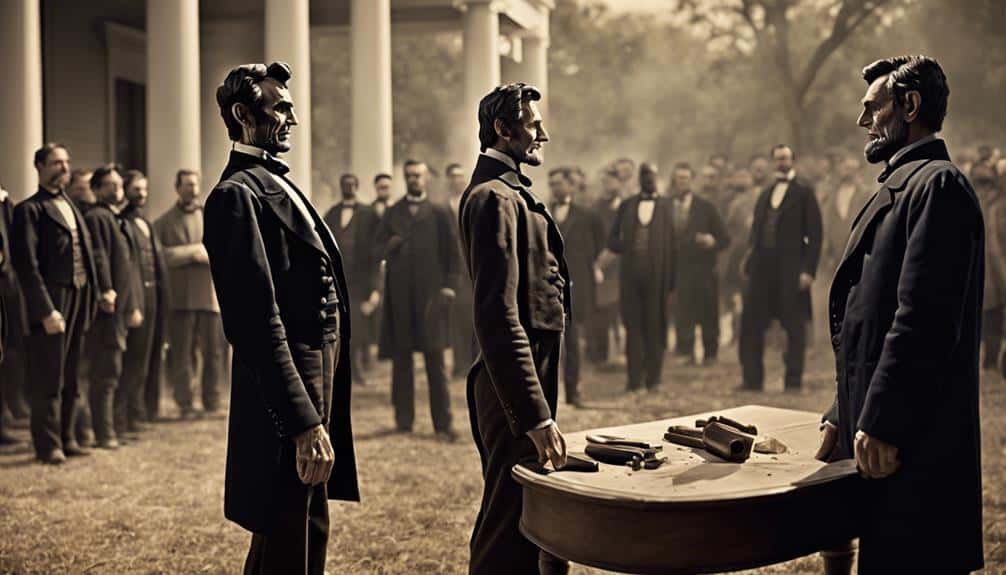
Rarely has an election carried as profound and lasting an impact as Lincoln's victory in 1864, which secured the Union's continuity and laid the foundation for post-war reconstruction. Lincoln's victory guaranteed the Civil War would be fought to a conclusive end, demonstrating the Union's resolve to maintain its integrity and abolish slavery. McClellan's defeat signaled that the American public was committed to Lincoln's vision, reinforcing the nation's determination to see the conflict through.
The election's implications extended far beyond the battlefield. By winning, Lincoln set the stage for the Reconstruction era, a period marked by significant challenges and opportunities for African Americans. The selection of Andrew Johnson as vice president, and his subsequent rise to the presidency after Lincoln's assassination, had a lasting impact on the nation's trajectory. Johnson's approach to Reconstruction differed markedly from Lincoln's, influencing the post-war implications for the South and the newly freed African Americans.
Key outcomes of Lincoln's victory:
- Union's future: Guaranteed the preservation of the Union and the end of the Civil War.
- Presidential impact: Elevated Andrew Johnson to the presidency, shaping Reconstruction policies.
- African Americans: Paved the way for significant, though contentious, advancements in civil rights.


